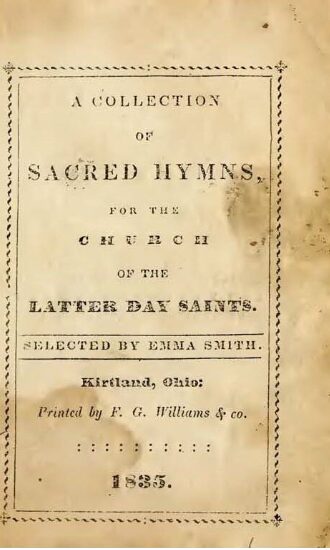Who was Emma Smith: Pioneer in the Mormon Church

Emma Hale Smith, Joseph Smith’s wife, was a pivotal figure in the early history of The Church of Jesus Christ of Latter-day Saints, also called the LDS Church or Mormon Church. Her life was marked by significant contributions, personal sacrifices, and enduring faith amidst the challenges that came with being married to the founder of a new religious movement. Here is an in-depth look at Emma Smith’s life, her role in the church, and her lasting legacy.
Early Life and Marriage
Emma Hale was born on July 10, 1804, in Harmony Township, Pennsylvania, to Isaac Hale and Elizabeth Lewis Hale. Raised in a devoutly religious and industrious family, Emma was known for her intelligence, strong will, and dedication to her family’s Methodist faith. She met Joseph Smith in 1825 when he was boarding with the Hales while working in the area. Despite her family’s initial disapproval, Emma and Joseph developed a deep bond.
On January 18, 1827, Emma and Joseph eloped and were married in South Bainbridge, New York. Their early years of marriage were marked by financial struggles and the challenges of Joseph’s religious pursuits, including his work on the translation of the Book of Mormon.
Role in the Early Church
Emma played an indispensable role in the early days of the LDS Church. As Joseph’s confidante and supporter, she was instrumental in the translation of the Book of Mormon. She served as a scribe for Joseph during part of the translation process and was one of the first to believe in and support his prophetic mission. Emma was asked to select the hymns for the church’s 1835 hymnbook.
In addition to her supportive role, Emma faced the difficulties of frequent relocations, persecution, and the loss of children. She gave birth to nine children, five of whom did not survive infancy, and she adopted two more. Despite these personal hardships, Emma remained steadfast in her faith and commitment to Joseph’s work.
The Relief Society
One of Emma Smith’s most significant contributions was her role in the establishment of the Relief Society, the women’s organization of the LDS Church. On March 17, 1842, in Nauvoo, Illinois, Joseph Smith organized the Relief Society with Emma as its first president. Under her leadership, the Relief Society focused on charitable work, education, and spiritual growth, and it continues to be a vital part of the church today.
Emma’s leadership in the Relief Society demonstrated her organizational skills and her deep concern for the welfare of church members. She emphasized the importance of women’s education and empowerment, setting a precedent for the active role of women in the church.
Challenges and Controversies
Emma’s life was also fraught with challenges and controversies, particularly concerning the practice of polygamy. Joseph Smith introduced the doctrine of plural marriage in the early 1840s, a practice that Emma found deeply distressing. Although she was aware of some of Joseph’s plural marriages, she struggled with the doctrine and its implications for her family and her relationship with Joseph. So, Joseph Smith had wives, how many? Probably around 30-40, the majority of whom he did not have a sexual relationship with.
The tension over polygamy strained Emma’s marriage and contributed to her complex legacy within the church. After Joseph’s death, Emma vehemently opposed the continuation of polygamy, aligning herself with factions of the church that rejected the practice.
Life After Joseph Smith’s Death
Joseph Smith was murdered on June 27, 1844, leaving Emma a widow with young children to care for. In the tumultuous period following his death, the church faced leadership disputes and further persecution. Emma chose not to follow Brigham Young and the majority of the church members to the Utah Territory. The relationship between Emma and Brigham Young was so fraught that some people questioned, was Emma Smith excommunicated? The answer is no, she was not.
Emma remained in Nauvoo and later married Lewis C. Bidamon, a non-Mormon, in 1847. Her decision to stay in Nauvoo and her subsequent marriage to Bidamon marked a significant divergence from the main body of the LDS Church. She focused on providing for her family and preserving her late husband’s legacy. Emma was also instrumental in the formation of the Reorganized Church of Jesus Christ of Latter Day Saints (now Community of Christ), which was led by her son, Joseph Smith III.

Legacy
Emma Smith’s legacy is multifaceted. She is revered for her unwavering support of Joseph Smith and her foundational role in the early church, particularly through the Relief Society. Her personal strength, resilience, and dedication to her family and faith are widely acknowledged and respected.
However, her life also reflects the complexities and challenges of the early Latter-day Saint movement. Her struggles with polygamy, her decision to stay in Nauvoo, and her involvement with the Reorganized Church illustrate the difficult choices she faced and the impact of those decisions on her legacy.
Today, Emma Smith is honored by members of the LDS Church and the Community of Christ for her contributions and her enduring faith. She is remembered as a pioneering woman who played a crucial role in the establishment of a major religious movement and who navigated the profound personal and communal challenges that came with it.
Conclusion
Emma Smith was more than just the wife of the prophet Joseph Smith; she was a key figure in the early LDS Church, a leader, and a mother who faced immense personal trials with dignity and strength. Her contributions to the church, particularly through the establishment of the Relief Society, continue to influence the lives of Latter-day Saint women today. Despite the controversies and challenges she faced, Emma’s legacy as a faithful and devoted woman endures, offering a poignant reminder of the human aspects of religious history.





